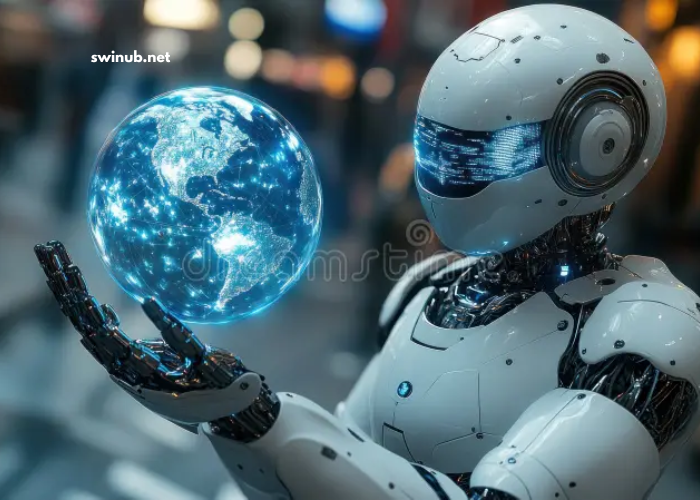The integration of artificial intelligence (AI) into modern technology is arguably one of the most transformative shifts in the digital landscape. From automation in industries to advancements in communication, healthcare, and finance, AI is reshaping every aspect of our lives. In this article, we explore the diverse impacts of AI on technology trends, focusing on how it has influenced innovation, efficiency, and future possibilities.
The Rise of AI in Technology
Artificial intelligence has evolved significantly in recent years, transitioning from a theoretical concept to a practical tool that powers a wide range of modern technological applications. AI systems are now capable of analyzing vast amounts of data, making predictions, and solving complex problems in ways that were once thought impossible. This rapid evolution has led to AI becoming a central pillar in the development of new technologies.
AI’s Role in Big Data and Analytics
One of the most noticeable effects of AI is its ability to enhance big data analytics. With businesses and organizations producing large volumes of data daily, AI-powered analytics tools help in extracting valuable insights from these vast datasets. Machine learning algorithms, a subset of AI, can identify patterns, predict trends, and provide actionable insights in real-time. This has made AI indispensable in industries such as e-commerce, marketing, and healthcare, where data-driven decisions are critical.
The Internet of Things (IoT) and AI Integration
AI and the Internet of Things (IoT) are two of the most prominent trends in modern technology. IoT refers to the network of interconnected devices that collect and share data, while AI enables these devices to analyze and act on the data autonomously. The combination of AI and IoT is creating smarter, more efficient systems. For example, AI-powered smart homes can learn users’ preferences and adjust lighting, heating, and security systems without human intervention. In manufacturing, AI-driven IoT devices can monitor equipment, predict failures, and automate maintenance tasks, reducing downtime and improving operational efficiency.
AI in Automation and Robotics
Automation and robotics are two fields where AI has made significant strides. The rise of AI-powered automation tools has enabled businesses to streamline operations and reduce human error. In industries like manufacturing, logistics, and even retail, AI-driven robots are performing repetitive tasks, allowing human workers to focus on more complex and creative activities.
Robotics in Manufacturing and Industry
AI-enabled robots are now capable of performing intricate tasks with a high degree of precision. In the automotive industry, for instance, robots equipped with AI-driven vision systems can assemble components with unmatched accuracy and speed. These robots can also learn from their experiences, improving their performance over time. This adaptability has revolutionized manufacturing, leading to more efficient production lines and reducing the need for human intervention in hazardous environments.
AI and Autonomous Vehicles
Another significant area where AI is making waves is in autonomous vehicles. Self-driving cars, trucks, and drones are powered by sophisticated AI algorithms that enable them to navigate and make decisions based on real-time data from sensors and cameras. These AI systems are capable of learning from their environment, making split-second decisions, and constantly improving their driving capabilities. The potential of AI in autonomous vehicles could reshape the transportation industry, reduce traffic accidents, and enhance the efficiency of logistics and delivery services.
AI in Healthcare and Medicine
The healthcare sector has been profoundly impacted by AI, with numerous applications emerging that enhance patient care, improve diagnoses, and streamline administrative processes. AI technologies are enabling medical professionals to provide more personalized and accurate treatments while reducing costs and improving outcomes.
AI for Medical Imaging and Diagnostics
AI-powered medical imaging tools are helping doctors detect diseases such as cancer, heart conditions, and neurological disorders at earlier stages. These AI systems can analyze medical images such as X-rays, MRIs, and CT scans with remarkable accuracy, often identifying issues that might be missed by the human eye. For instance, AI algorithms have been used to identify early signs of breast cancer or detect abnormalities in brain scans, allowing for quicker and more accurate diagnoses.
Personalized Medicine and Drug Development
AI is also revolutionizing personalized medicine, where treatments and interventions are tailored to individual patients based on their genetic makeup and lifestyle. By analyzing patient data, AI systems can predict how a person will respond to certain medications, ensuring more effective treatment plans. In drug development, AI is speeding up the discovery of new drugs by predicting how different compounds will interact with the body, reducing the time and cost of bringing new medicines to market.
AI in Cybersecurity
As digital transformation accelerates, the need for robust cybersecurity solutions has never been more critical. AI is playing a vital role in enhancing cybersecurity efforts by identifying and mitigating threats more efficiently than traditional methods. AI-powered security systems can detect unusual patterns in network traffic, monitor for vulnerabilities, and predict potential security breaches before they happen.
Threat Detection and Response
AI-based cybersecurity systems are capable of analyzing vast amounts of data from network activity in real time. By using machine learning algorithms, these systems can detect potential threats such as malware, phishing attacks, and unauthorized access attempts with incredible speed and accuracy. AI can even respond autonomously to certain threats, blocking malicious activity or alerting security personnel for further investigation.
Predictive Cybersecurity
AI is also helping organizations adopt a proactive approach to cybersecurity. Rather than simply reacting to threats, AI systems can predict potential vulnerabilities and prevent cyberattacks before they occur. By analyzing historical attack data and identifying patterns, AI systems can forecast emerging threats and help organizations strengthen their defenses.
AI in Consumer Technology
In the consumer technology space, AI has enabled the development of smarter devices that enhance user experiences. From virtual assistants to personalized recommendations, AI is making everyday tasks easier and more efficient.
Smart Assistants and AI-Driven Devices
Virtual assistants like Amazon Alexa, Google Assistant, and Apple Siri are powered by AI algorithms that allow them to understand and respond to natural language. These AI-powered assistants can perform a wide range of tasks, from setting reminders and controlling smart home devices to providing real-time information and managing schedules. As AI continues to improve, these assistants are becoming more intuitive and capable, offering personalized suggestions and actions based on user behavior.
AI in E-Commerce and Retail
AI is transforming the e-commerce and retail industries by enhancing customer experiences through personalized recommendations and predictive analytics. AI algorithms analyze customer data, including browsing history and purchase patterns, to suggest products that are likely to interest them. This personalized approach increases customer engagement and drives sales. Additionally, AI-driven chatbots are improving customer service by offering instant support and answering frequently asked questions.
The Future of AI and Technology Trends
As AI continues to advance, its influence on modern technology will only grow. The potential applications of AI are vast, and new trends and innovations are emerging regularly. However, as AI becomes more integrated into our daily lives, there are both opportunities and challenges to consider.
Ethical Considerations and AI Governance
One of the key challenges in AI development is ensuring that the technology is used responsibly and ethically. Issues such as bias in AI algorithms, data privacy, and the potential for job displacement due to automation need to be addressed. Governments, businesses, and research organizations must work together to establish frameworks for AI governance that promote transparency, fairness, and accountability.
AI and the Workforce
The rise of AI-driven automation is likely to have significant implications for the workforce. While AI has the potential to create new job opportunities, particularly in fields like data science and AI development, it also poses a threat to certain industries that rely on manual labor or routine tasks. To mitigate these effects, there must be a focus on reskilling and upskilling workers to thrive in an AI-powered economy.
Conclusion
The impact of AI on modern technology trends is profound and far-reaching. From revolutionizing industries such as healthcare, finance, and manufacturing to transforming everyday consumer experiences, AI is enabling innovation, improving efficiency, and unlocking new possibilities. As AI continues to evolve, it will shape the future of technology, and its integration will undoubtedly drive further advancements in areas such as automation, robotics, and cybersecurity. However, with these advancements comes the responsibility to ensure ethical practices and prepare for the changing dynamics of the workforce. AI’s role in shaping the future of technology is undeniable, and its continued growth promises exciting developments for years to come.


